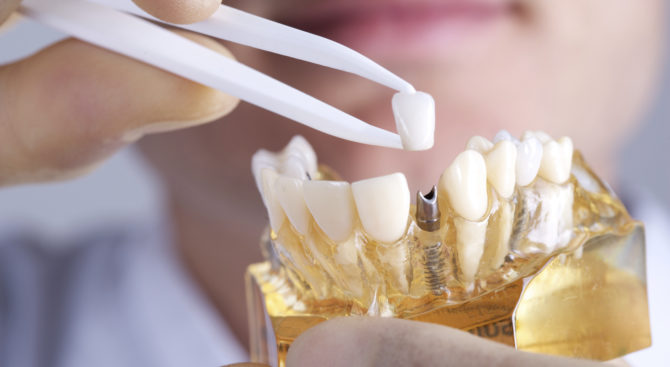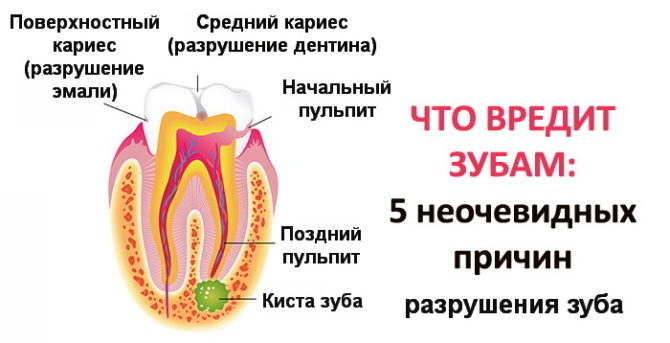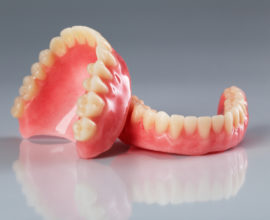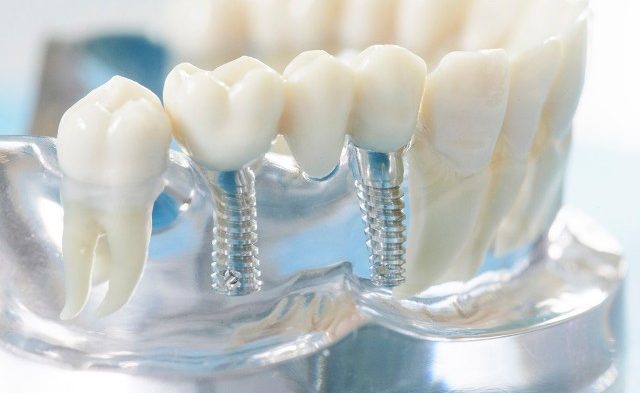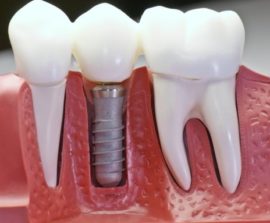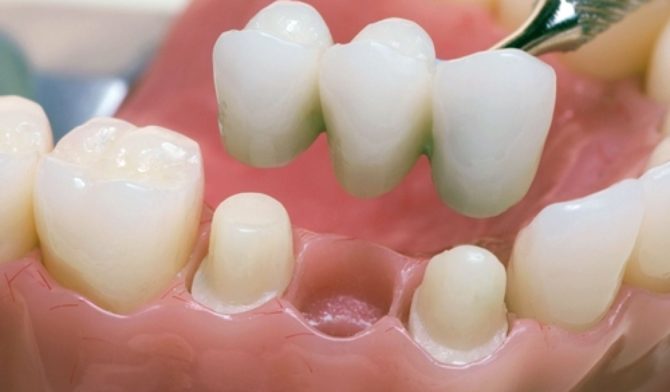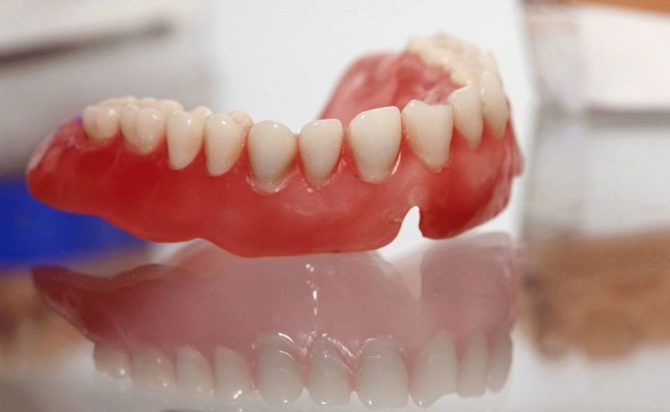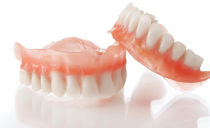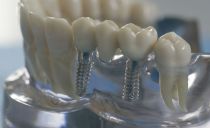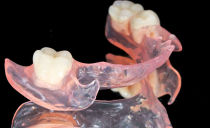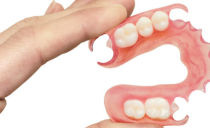The choice of dentures with partial absence of teeth: which are better
With a partial absence of teeth, a removable denture or a non-removable denture can be installed - which is better in this or that case, the dentist chooses, but the patient makes the final decision. The choice of prosthetic method is carried out taking into account the causes of partial adentia, age and state of human health, physiological characteristics, price factor.
Content
Causes of tooth loss
Most often, people face the loss of chewing teeth, since during chewing food, the entire load falls on the molars, which leads to their rapid destruction. The classic causes of tooth loss include:
- Deep caries, pulpitis and periodontitis, due to which you have to remove the tooth directly from the root to prevent further complications.
- Periodontitis and periodontosis, in which there is a resorption of periosteal bone tissue and ligaments that hold the tooth in the hole.
- Root cysts, which can appear even on absolutely healthy teeth and for a long time not manifest themselves. Sometimes it is possible to save the tooth itself, but it is almost always necessary to remove the pulp.
The most difficult thing is to do prosthetics when a tooth falls out due to generalized periodontitis of the lower or upper jaw.
Preparation for prosthetics
The stages that lead to the preparation of the oral cavity for prosthetics depend on the cause that led to the loss of the tooth. Usually this procedure consists of several stages:
- removal of soft and hard plaque from enamel and interdental spaces;
- polishing teeth and coating with fluoride mixture;
- jaw radiography;
- replacement of damaged or defective fillings;
- complex treatment of the root system;
- preparation of roots for fixing prostheses;
- splinting of loose elements of the dentition.
During the preparatory phase, periodontal tissues must be cured so that the existing movable teeth can withstand the load.
A few months before the upcoming implantation, it is necessary to sanitize the oral cavity. A week or 10 days before surgery, you can not take aspirin and other medicines that thin the blood.
How to choose a prosthesis depending on the age of the patient
For a long time, the installation of fixed dental implants was contraindicated in patients older than 35-40 years. Today this restriction has been lifted, but doctors still insist that It’s better for older people to have full removable dentures, since their jawbone tissue is subject to destructive irreversible changes (atrophy), which simply will not allow the implant to fully grow.
According to statistics, bone diseases are found in every second elderly person. In addition, in old age the metabolism and tissue regeneration rate are reduced, which slows down the process of implantation of the prosthesis.
The risk of rejection of artificial teeth in the elderly is high enough. Moreover, it exists not only during surgery, but also in the postoperative period.In addition, implantation uses not one-stage, but two-stage prosthetics with long healing periods, as elderly patients have reduced immunity, which is fraught with the development of inflammation.
Children are better off having removable dentures.no matter what teeth fall out: milk or permanent. This is due to the fact that the child is growing, and the implant in the jaw will inhibit the development of the bones of the skull and soft tissues. The best place to install an acrylic prosthesis is because it helps correct the bite and is relatively inexpensive.
How to choose a prosthesis based on physiological characteristics
Key contraindications for implantation are:
- pathology of the circulatory system, for example, with a violation of blood coagulability, no dental operations can be performed at all;
- mental illness;
- oncological neoplasms;
- connective tissue diseases;
- insufficient bone tissue;
- HIV and AIDS;
- seropositive infections (tuberculosis);
- diabetes;
- osteological disorders;
- endocrine diseases;
- cachexia (exhaustion);
- a small distance to the nasal, maxillary sinus;
- individual intolerance of used drugs, including anesthetics.
In the presence of these diseases, a person is allowed to install only removable dentures.
Relative contraindications for implantation include:
- defective bite;
- bone pathology;
- smoking: after implantation, you can’t smoke for two weeks, since there is a high risk of implant rejection;
- exacerbation of allergic syndromes: a reaction to denture plastic may also develop.
Any method of prosthetics is contraindicated in pregnancy.
Fixed dentures
Fixed dentures are fixed on teeth that are better preserved, or on an implanted pin. They do not need to be removed and processed, in addition to daily brushing.
There are 4 types of prostheses for this type of dental prosthetics: implants, bridges, crowns and inlays - which one is best for a particular patient, the doctor must decide. For instance, implant implantation is the best type of prosthetics for anterior teeth, and bridges are indicated for patients with full or partial edentulous.
Implantation of partially lost teeth
This type of prosthesis involves the installation of a pin instead of the root of the tooth that has been removed. The abutment and crown are put on the pin. This design is better, more reliable and more aesthetic than a removable removable jaw. It is great for restoring your front teeth.
The best materials for dental prostheses are:
- ceramics;
- titanium;
- stainless steel
- chrome alloy.
Indications
Implants are inserted with full and partial adentia. They are especially justified in the absence of one, two or three teeth and in the presence of end defects of the dentition. They look beautiful, and therefore stare even because of cosmetic reasons. They resort to implantation if the patient is allergic to plastic products, there is a pronounced gag reflex to removable dentures.
Benefits
Implantation allows you to eliminate a cosmetic defect in the dentition without harm to neighboring teeth and prevents bone resorption. Such prostheses are expensive, but they have a long service life.
disadvantages
The implant takes a long time to take root: the implantation process can take up to six months. After all the manipulations, the prosthesis may not even take root if the body rejects it as a foreign object. In addition, during the postoperative period, the occurrence of bleeding, swelling and pain is very likely. But despite all the disadvantages, the main disadvantage of this type of prosthetics is its high price.
Dentures
A bridge is a structure fixed using supports on prostheses, special adhesive plates or real teeth (additional grinding is required). Sometimes it is fixed with special locks and installed without any supports. A bridge replaces several missing teeth at once.
Classification
Depending on the material taken as the basis of bridge structures, it is customary to distinguish three of their types:
- Ceramic-metal. The base is made of metal coated with ceramics.
- Metal-plastic. Made of metal and plastic.
- Combined. Made from an alloy of aluminum and zirconium oxide.
Minuses
Installing a bridge requires turning your own teeth. In the future, due to increased mechanical load, they can become mobile, therefore, if possible, in the absence of one or more teeth, it is better to put clasp dentures or implants.
Removable dentures
If a person does not have several teeth in a row, then he can put removable dentures. Outwardly, they are not much different from fixed structures, but they must be periodically removed and cleaned.
There are three types of removable dentures:
- clasp;
- acrylic;
- from nylon.
Clasp constructions
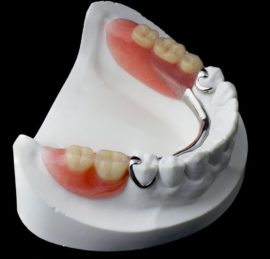 These are arc dentures with fixation on two extreme teeth or implants. This design allows the patient to chew food qualitatively, since the mechanical load falls on the supporting teeth that remain in the jaw.
These are arc dentures with fixation on two extreme teeth or implants. This design allows the patient to chew food qualitatively, since the mechanical load falls on the supporting teeth that remain in the jaw.
Indications
Clasp dentures can be placed if a person has lost one or more teeth. But they are suitable only in the presence of minor deformities of the dentition, which require minor correction.
pros
- Clasp dentures are relatively inexpensive.
- They are firmly and reliably fixed in the oral cavity.
- These structures are easy to care for, they do not even need to be removed at night.
- The period of getting used to clasp dentures takes only a few weeks.
Acrylic and Nylon Dentures
Acrylic dentures are lightweight, placed using special hooks and do not require turning of adjacent teeth. In the same way, more modern nylon designs are installed.
Benefits
- The ability to select the color of a removable denture, which is better combined with the rest of the units in the dentition, with partial prosthetics.
- Nylon and acrylic structures are quickly manufactured, easy to operate, and easy to clean and repair when chips and cracks occur.
disadvantages
Removable nylon and acrylic dentures are very fragile and take root for a long time, can provoke the development of allergic reactions.
The main disadvantage of acrylic structures is the porous structure, which is a favorable environment for the development of pathogenic microorganisms, which can lead to the destruction of supporting teeth.
Also disadvantages of acrylic dentures include:
- damage to tooth enamel during prolonged use;
- high probability of developing allergies;
- the hardness of the plastic, leading to cracks in the structure;
- insufficiently strong fixation in the oral cavity.
Features of prosthetics of chewing teeth
When prosthetics of chewing teeth, it is necessary to take into account the reliability of the material used for the manufacture of the prosthesis, and the method of attachment, since this design will be overloaded in the future.
Plastic dentures cannot be placed in the area of chewing teeth: they cannot withstand chewing loads. Plastic constructions are best placed on the front teeth.
If there are not all chewing teeth, it is better to install a ceramic-metal or solid metal prosthesis. In terms of practicality, such designs are the best, since they are able to withstand severe mechanical loads. They can not be called aesthetic, but it does not matter, since chewing teeth are not visible to others.
Significant disadvantages of this type of prosthetics (especially on the lower jaw) are:
- possible problems with diction;
- discomfort when chewing.
Some time after the installation of artificial teeth, the unpleasant manifestations will disappear. To speed up adaptation, prosthetic dentists advise chewing food more thoroughly and reading aloud more often.

